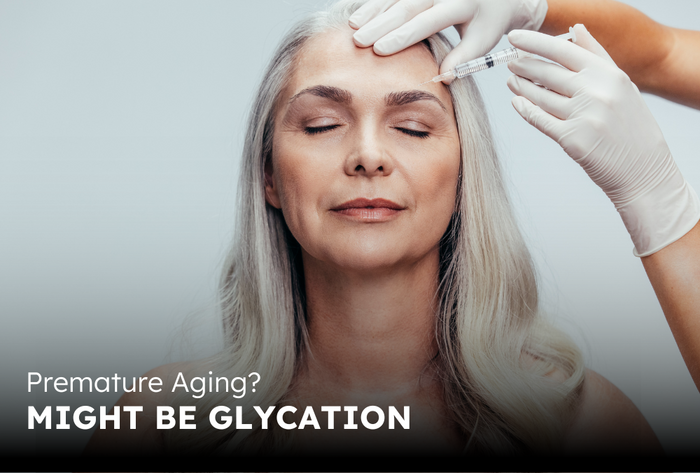When we talk about premature aging, there's one important factor that often gets overlooked but plays a huge role in skin health– glycation.
Glycation
/ ɡlaɪˈkeɪʃən / nounA biochemical process that affects many parts of our body, especially our skin. Let's dive into what glycation does to our skin and how we can tackle it.
At its heart, glycation happens when sugars and proteins react, creating structures called advanced glycation end products (AGEs). Normally, this happens naturally in our bodies, but it speeds up when we have high blood sugar for a long time, deal with oxidative stress, or have inflammation. Unfortunately, glycation doesn't just stop at biochemical reactions – it messes with how our cells work and damages our tissues.
Glycination + Collagen
One of the most noticeable effects of glycation is how it ages our skin. Our skin takes a hit from AGEs because they mess with collagen, the protein that keeps our skin elastic and firm. When collagen gets glycated, it changes in a way that makes it less effective. This leads to sagging skin, wrinkles, and those fine lines we associate with getting older.Glycation doesn't stop there. It also messes with how our skin cells renew themselves, making our skin look dull and tired. AGEs also ramp up inflammation and oxidative stress in our skin, making existing damage worse and making us look older faster.
So, what can we do about glycation?
Here are some simple steps:Watch What You Eat: Cut back on sugary and high-glycemic foods to keep your blood sugar levels steady. Eating foods with lots of antioxidants, like fruits, veggies, and green tea, can help fight the stress that glycation causes.
Stay Active and Rest Up: Regular exercise keeps your blood flowing and your metabolism humming, which can help counter glycation's effects. And don't skimp on sleep – it's crucial for your cells to repair and stay healthy, giving you a natural defense against AGEs.
Consider Supplements: Some supplements like Control by Mend, can help keep your blood sugar levels stable, slowing down glycation and its effects. Use the Right Skincare: Look for skincare products with antioxidants and anti-glycation ingredients, such as vitamin C and alpha-lipoic acid. These can protect your skin from glycation damage and keep your collagen production up.
By understanding glycation and taking targeted steps to combat it, we can keep our skin looking youthful and healthy for longer.



